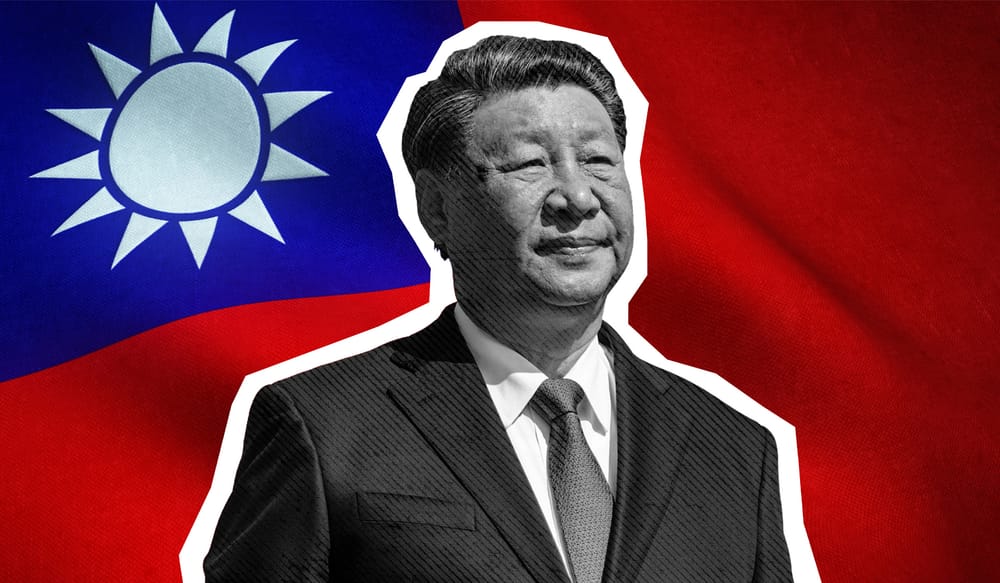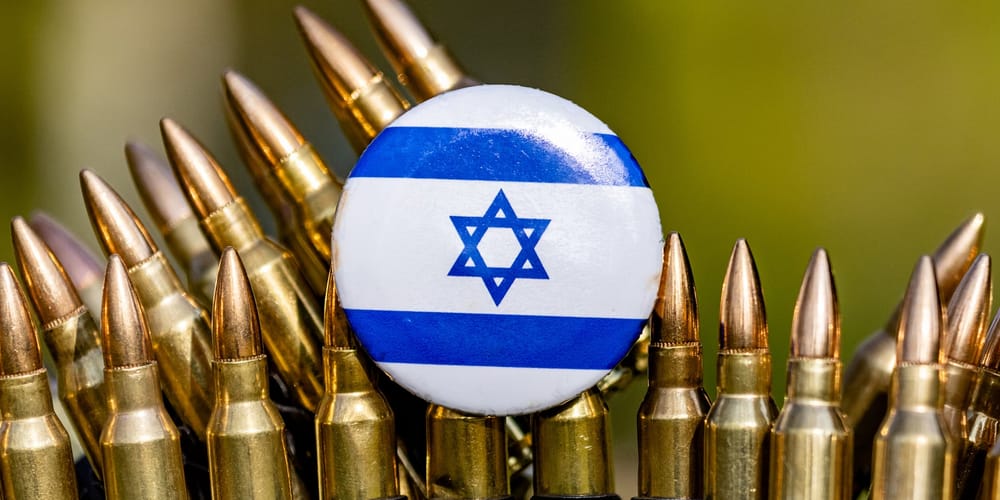A year has passed since the October 7 massacre perpetrated by Hamas, which cost 1200 lives of, mostly civilian, Israelis. Within a few weeks the IDF mobilised and crossed into Gaza to dispense justice, bit by bit dismantling the terrorist organisation and killing thousands of its fighters, leaving the impoverished strip in ruins.
Yet another chapter in a long list of conflicts between Israel and its Arab and other Muslim neighbours, both near and far, has unfolded, and continues to be internationally framed as the continuation of a seven-decade struggle for Palestinian statehood.
It's a useful soundbite – too bad it is wrong.
Like on all occasions since 1948, the Palestinian-Israeli conflict, or the sheer existence of Israel on what its enemies believe to be a sacred Muslim land, have merely been a facade, a convenient narrative which has meant to serve the interests of the one bringing it up.
You begin to see it clearly once you start asking very simple questions to establish the logical order of events, starting with the most recent one: why did Hamas attack Israel last October in the first place?
Were Palestinian lives in Gaza in danger? Was it, perhaps, an opportunity to make significant military or political gains, in service of the Palestinian cause?
No, Hamas attacked Israel to derail the diplomatic efforts towards normalisation of bilateral ties with Saudi Arabia, which were considered a threat to Hamas' main supporter: Iran.
The senseless butchery of Israeli men, women and children was meant to elicit a military response so severe that it would make future expansion of the Abraham Accords impossible for many years.
Like on multiple occasions before, widespread destruction and martyrdom of Palestinian civilians were required to trigger international outrage, pushing Israel into growing isolation.
But if Hamas is merely an Iranian proxy, then we have to ask another question: why does Iran have a problem with Israel?
The countries are not neighbours, have no history of conflict and used to have very friendly relations, robust bilateral trade and investment in both private and public sectors (including military cooperation).
Following Turkey, Iran was the second Muslim-majority country in the world to formally recognise Israel (though that, of course, is no more).
So, what has ever happened that would make Iranians label Israel the "Little Satan" (next to the USA, the "Great Satan"), and devote their national efforts to wiping it off the map?
Islamic Revolution of 1979.

Following the successful takeover, the religious fundamentalists in charge of the country have made it their mission to take leadership of the Muslim world and inspire similar uprisings elsewhere.
Thus the conflict for leadership of the ummah began, pitting Iran against many of its neighbours, most of whom, like the Saudi monarchy, were seen by Khomeini as sinful and un-Islamic.
Israel, labeled a Western colonial transplant in the Middle East, was on the list as well and has, over the years, made an excellent enemy to rally Muslims against, allowing the regime in Tehran to emphasise its moral superiority.
Fortuitously for the ayatollahs, Arab neighbours of Israel have become impatient and irate with Palestinians, who have regularly caused trouble in the countries hosting them. They attempted to overthrow the Hashemite monarchy in Jordan in 1970, pushed Lebanon into civil war in 1975, sided with Saddam Hussein during his invasion of Kuwait, or spilled extremism over from Gaza, in support of jihadist groups in the Egyptian Sinai.
Following nearly two decades of failed negotiations about the establishment of a Palestinian state, many in the Arab world blamed the PLO for its lack of flexibility in the face of a historic opportunity.
“If Arafat rejects this, it won’t be a mistake, it will be a crime.” Saudi prince Bandar bin Sultan on Clinton's parameters for peace, 2000.
Subsequently, either voluntarily or under Western pressure, most have withdrawn direct sponsorship of armed Palestinian groups like Hamas, now reliant only on Turkey, Qatar and Iran.
This Arab abandonment (save for Doha, which in turn had its own conflicts with other Gulf neighbours) has provided an excellent opportunity for Iran to swoop in and assume patronage even over those organisations which were nominally Sunni, displaying its devotion to fighting the enemy allegedly depriving Palestinians of statehood and desecrating holy sites of Islam, bridging the Shia-Sunni divide.
What Iran fears, however, is that Arab disengagement from the conflict may lead to Israeli-Arab rapprochement, which could undermine its religious propaganda so dependent on the raging conflict in Palestine.
Normalisation of relations between Jerusalem and Riyadh would not only open up opportunities for bilateral military cooperation to contain Iran but also serve as evidence that peace with the Jews is possible even for the custodian of Mecca and Medina – and not an unattractive proposition after decades of bloody warfare.

After all, Iranian leadership continues to justify its existence and actions as the holy duty of the religious revolution against sinful westernisation of Islamic societies.
This is important for the regime both inside Iran and outside of it.
Witnessing how much more prosperous and peaceful the Arab world is becoming, Iranians may begin turning out in ever greater numbers to the protests erupting every few years, ultimately toppling the theocratic regime. Meanwhile, internationally, it serves Tehran's struggle to win hearts and minds of Muslims around the world.

As long as Israel is seen as the enemy of Islam, Iran can control the narrative and portray itself as the leader of the holy war against it, influencing Muslim societies around the world – frequently against their current rulers.
With Israel fighting in Gaza or Lebanon, most Arab nations have to at least maintain appearances, even if their relations with Palestinians are lukewarm at best and they would like to settle their relations with Jerusalem. As long as bombs are flying they can't be seen pacting with the devil, as most of their citizens remain hostile to Israel. Not even absolute monarchies of the Gulf can ignore their views.
In other words, Iran needs the perpetual conflict in Israel as a medium for its own particular brand of virtue-signalling, in a fundamentalist, religious context.
It's not about Israel, it's not about liberating Palestinians, it's about assuming leadership of the Muslim world to mobilise other societies towards establishment of Islamic rule modelled on Iran, while showing regular Iranians that their mission is justified.
Curiously, this isn't far from how conflicts with Israel were utilised for political aims in the secular context, prior to Islamic revival of late 70s.
Arab nationalism
Before Israel became a useful tool for Islamic conservatives, it was used by Arab nationalists to present themselves as worthy leaders as well.
Following the collapse of the Ottoman Empire after World War I, much of the Arab world had its first shot at sovereignty in several hundred years. Early to mid 20th century was spent by young nations seeking their own identity, including ideas of pan-Arab unity, which flourished in the decades after World War II.
For the longest time mere subjects of Turkish Empire, many Arabs now considered establishing their own to be an attractive prospect. With tens of millions of inhabitants from the Straits of Gibraltar to the Hormuz and Horn of Africa, all united by a common religion and (mostly) common language, a Pan-Arab entity could be a global power.
Of course it was easier said than done, as it had quickly become clear that regional differences would be hard to overcome, not to mention agreeing on who would eventually govern such a nation.
There were multiple minor attempts, like the United Arab Republic formed by Egypt and Syria between 1958 and 1961, or the Arab Federation between Jordan and Iraq, which lasted mere six months in 1958, but nothing could outlast mutual distrust between different Arab leaders, dotting regional politics with coups and uprisings.
There was also a non-Arab thorn in the middle of the Arab territory – Israel – albeit one which often proved an excellent adversary to use for political purposes of Arab nationalists of the time, as observed by one of my favourite commentators, a retired commodore in the Saudi navy, Abdulateef Al-Mulhim in his articles for the Arab News:
"If Israel were recognized in 1948, the Palestinians would have been able to free themselves from the hollow promises of Arab dictators who kept telling them the refugees would be back in their homes, all Arab lands would be liberated and Israel would be sent to the bottom of the sea. Some Arab leaders used the Palestinians to suppress their own people and stay in power.
Since 1948, if an Arab politician wanted to be a hero, he had an easy way of doing it. He just needed to shout as loud as he could about his intention to destroy Israel, without mobilizing a single soldier (talk is cheap).
If Israel were recognized in 1948, there would have been no need for a coup in Egypt against King Farouk in 1952 and there would have been no attack on Egypt in 1956 by the UK, France and Israel.
Also, there would have been no war in June 1967, and the size of Israel would not have increased and we Arabs would not have the need for a UN resolution to beg Israel to go back to the pre-1967 borders. And no war of attrition between Egypt and Israel that caused more casualties on the Egyptian side than the Israeli side.
[...]
Palestinian misery was also used to topple another stable monarchy, this time in Iraq, and replace it with a bloody dictatorship.
[...]
If Israel had been recognized in 1948, the 1968 coup would not have taken place in another stable and rich monarchy – Libya, where King Idris was toppled and Muammar Gaddafi took over.
There were other military coups in the Arab world, such as in Syria, Yemen and Sudan. And each one of them used Palestine as the reason for such acts."
Abdulateef Al-Mulhim
As you can see, Arab nationalists used to behave just like Iranians do today, attacking Israel as a means to elevate themselves by parading their superiority – only at the time it wasn't about religion but cynical nationalist politics.
Nobody has ever cared about Palestine - not even Palestinians themselves
The original 1948 Arab-Israeli war was really the only conflict truly about Israel, since it erupted in opposition to the very creation of the country.
But upon closer inspection it turns out that even it was as much about Israel as it was about Arab pride and territorial ambitions of all participants – none of whom actually sought the establishment of independent Palestine.
Egypt wanted to claim its southern territories, Lebanon and Syria the north, and even some in Iraq fantasised about uniting the entire Fertile Crescent, from the Mediterranean to the Gulf.
King Abdullah of Jordan dreamt of taking everything, including parts of Syria and Lebanon, so it is no surprise that he annexed the West Bank following the cessation of hostilities in 1949 – a move that wasn't recognised even by his neighbours.
Both Egypt and Jordan treated the seized West Bank and Gaza as their own, with only short-lived, symbolic gestures towards Palestinians, before both territories were lost to Israel in the Six-Day War of 1967.
They had 20 years to create a free Palestine in the same lands that Israel is now accused of "occupying". They did nothing.

Once the establishment of the Jewish state became fait accompli, there was no real reason for Arabs to continue their hostilities, as Israel itself wanted to avoid confrontation, being a small nation surrounded by vastly more populous neighbours. It posed no threat to them.
But, as it often happens, once enough time passes nobody really remembers why they are angry anymore. At the same time the Palestinian issue was simply too valuable for Arab nationalists to pass up, as it could excuse much in both domestic and international politics.
Sentiments began shifting in the 1970s, beginning with the Black September, the unexpected death of Gamal Abdel Nasser, long seen as the face of Pan-Arab nationalism, Lebanese Civil War, Islamist uprising in Syria, Iranian Revolution, seizure of the Grand Mosque in Mecca, followed by Soviet invasion of Afghanistan, which became a breeding ground for violent terror groups, and Iran-Iraq war of the 1980s.
In the midst of the violence Arabs lost their last major assault on Israel, in the Yom Kippur war of 1973, which pushed Egypt to seek a diplomatic resolution, leading to Camp David Accords and the peace treaty between both countries by the end of the decade.
This is when Arab nationalism took the back seat, both displaced and often challenged directly by Islamic fundamentalism which continues to dictate the tone of Middle Eastern wars today.
In the midst of this transition Palestinians themselves have begun creating rifts in the Arab world, starting with their assault on the Hashemites and their role in the complete destruction of Lebanon, leading to expulsion of the PLO and Yasser Arafat to Tunisia in 1982. A year later his comments on Syrian involvement in the war made him a persona non grata in Damascus, while his support for Saddam Hussein's invasion of Kuwait led to mass exodus of 400,000 Palestinians expelled from the country in 1991, and a breakdown in relations until Arafat's death in 2004 and subsequent apology by Mahmoud Abbas.
Since the ill-fated coup attempt in Jordan in 1970, the Palestinian leadership has gradually gravitated away from its stated goals of fighting for liberation of their country, acting instead as a proxy, ally or enemy of various forces in conflicts which had nothing to do with Israel or Palestine.
This habit has never ceased, leading to the current alliance of Hamas to Iran and the paralysis of the kleptocratic administration of Mahmoud Abbas, which has failed to achieve any progress in the nearly 20 years since the war between Hamas and Fatah began the split of the Palestinian Territories.
Not even Palestinians care about Palestine anymore. For Hamas it's an excuse to do Iran's bidding and for Fatah to stay in power indefinitely, while filling the pockets of its corrupt leadership.
Endless war provides endless benefits
As we look into the past we can observe that for the longest time the only party interested in resolving the conflict and establishing lasting peace was Israel (though its patience seems to have run out now).
For everybody else involved the existence of Israel and the justification it provides for domestic and international actions has been far too valuable to let it succumb to diplomacy.
Why waste a useful war?
Even for the earliest 30 years of Arab-Israeli conflict (between 1949 and 1979) it wasn't so much about the unjust existence of the Jewish state nor the plight of Palestinian Arabs unfairly displaced from their homes, but rather hurt pride and ambition of Arab nationalists who yearned for influence at home and abroad at the expense of other Arabs as much as of the Jews.
Israel was an excellent punching bag which could help draw supporters in the same way it has been used by Islamic conservatives for the subsequent 45 years, until today.
When in doubt, punch Israel.
Nobody really cares about Israel, much less about wiping it off the map, which is and has been unrealistic for everyone but the most deluded. But it's an incredibly useful distraction from the failed, corrupt governance of your own country (like Iran, Lebanon, Palestinian Autonomy itself or even Turkey to some degree) as well as a justification for some greater international mission (whether it's pursuing influence over all Arabs or, like today, all Muslims).
For terror groups it provides a raison d'etre and ample funding, which would otherwise cease if lasting peace was achieved.

Would Hamas continue receiving its millions if it had to govern Palestine for real, instead of firing rockets at Israel all the time? Would Hezbollah be kept off the hook for its billion dollar drug trade which helps to finance its terrorist mission and dominance over Lebanese politics?
The context is changing, the actors are different, but Israel remains as useful as ever. Too useful to let it live in peace.









